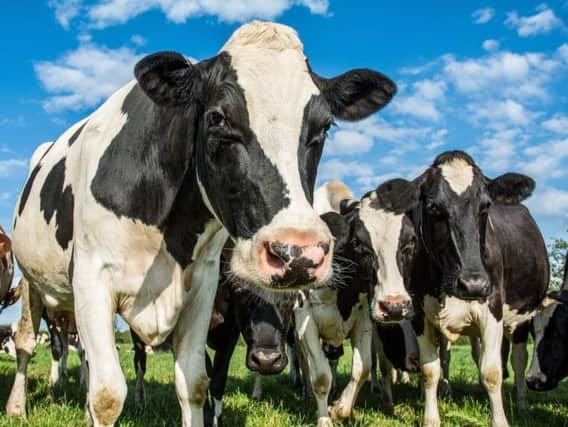Pardon moo: Scottish scientists on quest for low-emission cows


Livestock is a case in point - every little belch and trump given off by sheep and cattle sends out a waft of methane, a potent heat-trapping gas.
And the country is home to a lot of cows and sheep.
Farm animals are responsible for around five per cent of the UK’s total greenhouse gas emissions.
Advertisement
Hide AdAdvertisement
Hide AdAlthough it might seem like there is little that can be done about what is only natural, but studies have shown that a specially adapted diet can cut levels of methane emissions.
Scientists at Scotland’s Rural College (SRUC) have done extensive studies into emissions produced by cattle reared indoors, but technological restrictions have meant there is relatively little data on the amount of methane produced by animals that live outside.
Now they are launching on a pioneering new project that aims to fill that gap.
The researchers have teamed up with the University of Strathclyde to develop and adapt existing precision livestock farming technology to monitor and reduce methane production.
This includes animal-mounted activity sensors and systems that will record a beast’s location, feeding behaviour and weight as it roams around the fields.
Since around 90 per cent of Scotland’s cattle live outdoors for significant parts of the year, it is hoped the study will help identify the best options for managing grassland and grazing animals to cut methane emissions.
Professor Richard Dewhurst, from SRUC, said: “One of the key approaches for reducing methane emissions is to increase the health, fertility and longevity of animals.
“By adapting technologies used to monitor and manage these things for housed cattle, we expect to deliver similar benefits for grazing cattle.”
Advertisement
Hide AdAdvertisement
Hide AdProfessor Craig Michie, from the University of Strathclyde, added: “Creating a battery-powered methane-sensing unit with the required performance for grazing cattle builds on our expertise both in advanced optical sensors for hostile environments and the pioneering innovation of neck-mounted collars that identify key conditions of individual animals.”
UK farming minister George Eustice said: “Researchers in the UK are at the forefront of innovative solutions to tackle climate change and help us meet our world-leading target of net zero emissions by 2050.
“We are proud to be sponsoring this work by Scotland’s Rural College, which will bring forward new technologies to support farmers across all four corners of the UK rise to the challenge.”
The research team will face a number of key technical challenges, including the miniaturising of equipment, battery technology to permit long measurement periods, data transmission and capture for remote grazing environments.
The GrASTech project, which runs until September next year, has been granted £250,000 of funding from the UK government Department for Environment, Food and Rural Affairs as part of a collaborative research project with European partners.